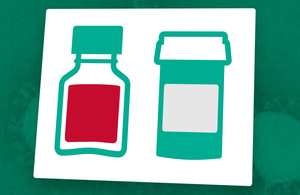MHRA suspends recruitment to COVID-19 hydroxychloroquine trials
Press release
The Medicines and Healthcare products Regulatory Agency (MHRA) has instructed UK clinical trialists using hydroxychloroquine to treat or prevent coronavirus (COVID-19) to suspend recruitment of further participants.

This means that no new participants will be recruited to these trials until further data which justifies their continuation have been provided, and any additional safety measures have been implemented.
This decision follows advice from the Commission on Human Medicines, which met on 1 and 5 June 2020 and reviewed the data that had been submitted for each trial in response to MHRA requests.
We followed the emerging concerns about use of hydroxychloroquine in COVID-19, and took into consideration the results from two different trials, including the UK’s RECOVERY trial which has provided convincing evidence of no meaningful mortality benefit in hospitalised patients with COVID-19.
Dr June Raine, MHRA’s CEO, said:
We have told those conducting clinical trials using hydroxychloroquine to treat or prevent COVID-19 to suspend recruitment into their trials.
Neither hydroxychloroquine nor chloroquine are licensed to treat COVID-19 related symptoms or to prevent infection.
It is important to note that patients taking hydroxychloroquine and chloroquine to treat other health conditions can continue to do so, as advised by their healthcare professional, as the balance of benefits and risks remains favourable in the licensed uses.
Hydroxychloroquine and chloroquine licensed in the UK
Hydroxychloroquine and chloroquine are licensed in the UK to treat different health conditions such as malaria, rheumatoid arthritis, lupus, amoebic hepatitis and abscess and certain dermatological conditions. These products should only be taken if prescribed by a healthcare professional and supplied by or under the supervision of a pharmacist on registered pharmacy premises.
Patients or healthcare professionals can report any suspected side effects from hydroxychloroquine or chloroquine taken by patients with COVID-19 via our Yellow Card COVID-19 reporting site.
If you would like to report any suspected side effects from hydroxychloroquine or chloroquine taken to treat other health conditions, please use our main Yellow Card site
Notes to editor
- There is currently no medicine specifically licensed for the treatment of Covid-19. See our guidance on chloroquine/hydroxychloroquine and COVID-19.
- The MHRA took into consideration the results released from the RECOVERY trial, showing no beneficial effect of hydroxychloroquine in patients hospitalised with COVID-19, and a New England Journal of Medicine publication using hydroxychloroquine as postexposure prophylaxis of COVID-19, concluding that hydroxychloroquine did not prevent illness compatible with Covid-19 or confirmed infection.
- Medicines and Healthcare products Regulatory Agency is responsible for protecting and improving the health of millions of people every day through the effective regulation of all medicines and medical devices in the UK by ensuring they work and are acceptably safe. All our work is underpinned by robust and fact-based judgements to ensure that the benefits justify any risks.
- The MHRAis a centre of the Medicines and Healthcare products Regulatory Agency which also includes the National Institute for Biological Standards and Control (NIBSC) and the Clinical Practice Research Datalink (CPRD). MHRA is an executive agency of the Department of Health and Social Care
- The Commission on Human Medicines (CHM) is a committee of the Medicines and Healthcare Products Regulatory Agency. The CHM advises ministers on the safety, efficacy and quality of medicinal products.
- The Yellow Card COVID-19 reporting site. is a separate platform dedicated to COVID-19 related reports and linked to the main Yellow Card scheme reporting site. Information provided by patients and healthcare professionals through their COVID-19 Yellow Card reports will be used alongside other scientific safety information such as clinical trials, scientific literature, other safety databases and studies to help MHRA to take action, if necessary, to make changes to the warnings given to people taking a medicine or review the way a medicine or a device is used to maximise benefit and minimise the risk to the patient.
- The Yellow Card scheme is MHRA’s system of monitoring the safety of medicines and medical devices in the UK and it acts as an early warning system to identify new, and strengthen existing, safety information about medicines, medical devices, falsified or defective healthcare products, and e-cigarettes.
- There currently are no vaccine and no medicines authorised to treat COVID-19 in the UK by the MHRA. However, several treatments authorised for other diseases are being used in patients with COVID-19.
Published 16 June 2020


